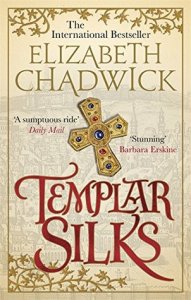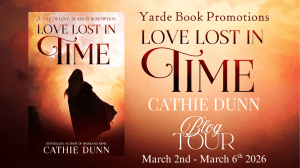 Today, I am pleased to welcome Cathie Dunn to my blog to share an excerpt from her novel, “Love Lost in Time.” I would like to thank Yarde Book Promotion and Cathie Dunn for allowing me to participate in this blog tour.
Today, I am pleased to welcome Cathie Dunn to my blog to share an excerpt from her novel, “Love Lost in Time.” I would like to thank Yarde Book Promotion and Cathie Dunn for allowing me to participate in this blog tour.
Excerpt:
From Chapter 2:
The feast of Easter, AD 777
Carisiacum, Neustria, Kingdom of the Franks
Shaking off her thoughts, her gaze drifted to her father, a close adviser to the king. Although older than Charles by a score years, Milo, count of Vaulun, could hold his own, looking resplendent in a fine silk tunic, a simple, yet beautifully carved leather belt, and his aristocratic face with a slightly long nose and dark-blue eyes.
Bursting with pride, Hilda regarded her father, now talking at ease with a young man of a darker hue, clearly of Visigoth heritage, with his black hair falling over strong shoulders, bright eyes, and a moustache reaching to his chin. There was something uncivilised about him. Shivers ran down her spine when he laughed at something her father said and patted him on the back. They raised their cups and took deep draughts of wine. Her father’s complexion reddened as the spirit took effect. She smiled.
“Lady…”
Rolling her eyes in mock annoyance, Hilda jumped out of the maid’s way again. This time, the girl carried a tray bearing two large bowls and several loaves of freshly baked bread, which she deposited in front of King Charles and other strategic places on the grand table, before she rushed back past Hilda with an apologetic smile.
“Nanthild! Daughter!” Father’s voice reached her. He waved her over. Disappointment hit her briefly, as she had enjoyed watching the preparations from the side. Hilda did not crave the attention that other girls here present cherished.
As she crossed the room to join him, the eyes of the young man by her father’s side never left her. It unnerved her a little – she was unused to male attention – and her heart beat a solid drum in her ears.
“My dear daughter, come,” her father said affectionately, his eyes full of joy, as he bid her sit on a stool beside him. Turning to the young man who was on Hilda’s other side, he added, “I will be lost without her. She has been looking after me well since my wife, her mother, passed away.”
A frown shrouded his features briefly at the memory, and she wanted to reach out to him, but refrained. Eight years earlier, her mother had died giving birth to her only brother, who himself had only survived for a sennight. Both Hilda and her father had felt their loss strongly, and the count had thrown himself even more into diplomacy and warfare for the king.
“I’m sorry to hear,” the young man responded solemnly, his voice a low hum. “We have seen so much death and sadness, too, including the loss of my parents last summer.”
Nodding, Hilda kept staring at the table, uncertain how to react.
“Here, let me…” The stranger filled a goblet with wine and handed it to her.
She looked at him from under her lashes. “I thank you, lord.” She raised it and took a small sip. The pungent scent of berries and grapes blurred her senses, and the full taste of even the one sip made her head spin.
“’Tis strong, this wine they brought up from Septimania.” Her father laughed. “But you will get used to it, daughter.”
She carefully placed the goblet onto the table, trying not to reveal her trembling hand, and pulled her brows together before risking a glance at him. What did he mean? Father was overly cheerful, his demeanour jovial. She saw contentment in his features as he gazed at her. And relief.
Her heart froze. Had he not said earlier he ‘would be lost’ without her?
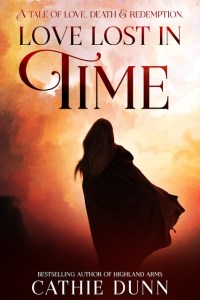 Blurb:
Blurb:
A reluctant daughter. A dutiful wife. A mystery of the ages.
Languedoc, France, 2018
Historian Madeleine Winters would rather research her next project than rehash the strained relationship she had with her late mother. However, to claim her inheritance, she reluctantly agrees to stay the one year required in her late mother’s French home and begins renovations. But when she’s haunted by a female voice inside the house and tremors emanating from beneath her kitchen floorboards, she’s shocked to discover ancient human bones.
The Mediterranean coast, AD 777
Seventeen-year-old Nanthild is wise enough to know her place. Hiding her Pagan wisdom and dutifully accepting her political marriage, she’s surprised when she falls for her Christian husband, the Count of Carcassonne. But she struggles to keep her forbidden religious beliefs and her healing skills secret while her spouse goes off to fight in a terrible, bloody war.
As Maddie settles into her rustic village life, she becomes obsessed with unraveling the mysterious history buried in her new home. And when Nanthild is caught in the snare of an envious man, she’s terrified she’ll never embrace her beloved again.
Can two women torn apart by centuries help each other finally find peace?
Love Lost in Time is a vivid standalone historical fiction novel for fans of epoch-spanning enigmas. If you like dark mysteries, romantic connections, and hints of the paranormal, then you’ll adore Cathie Dunn’s tale of redemption and self-discovery.
Praise
“From the richness of Charlemagne’s court and the regret of a daughter, as she stands over her mother’s grave, to the realisation of an enemy and a skeleton under the kitchen floor, Love Lost in Time: A Tale of Love, Death and Redemption by Cathie Dunn is the unforgettable story that traverses two very different times.”
The Coffee Pot Book Club, 5* Editorial Review
“The narrative is ripe with emotions as two independent women are pulled in unexpected directions… Both landscapes are beautifully penned for readers to easily get lost in. Additionally, the storylines are engaging, and each helped bring a satisfying conclusion to the other. An enjoyable tale about love, sacrifice, and self-discovery.”
Historical Novel Society
“The historical details are beautiful, and a book which could easily feel oppressively sad is cleverly lightened with the use of romance and a satisfying ending. Well written and easy to read, the historical side may be a little more compelling, but the contemporary details add a layer that cannot be ignored!”
In’DTale Magazine
“In Love Lost in Time, Ms Dunn creates a fascinating balance between a tragic love story set in the Visigoth empire of the eighth century, and a very modern historian on a quest to find her own personal history in picturesque Languedoc…
Thoroughly researched and beautifully told, both stories complement each other in narrative power and colourful scene-setting; and in the dual narrative, the main characters are compelling – each a product of destiny and following their fate, regardless of the cost.
Fans of Kate Mosse will relish this book…”
Discovering Diamonds Reviews
Buy Link:
Universal Buy Link: https://books2read.com/u/mq7DM9
https://mybook.to/LoveLostTime
This book is available on #KindleUnlimited.
Author Bio:
 Cathie Dunn
Cathie Dunn
Cathie is an Amazon-bestselling author of historical fiction, dual-timeline, mystery, and romance. She loves to infuse her stories with a strong sense of place and time, combined with a dark secret or mystery – and a touch of romance. Often, you can find her deep down the rabbit hole of historical research…
In addition, she is also a historical fiction book promoter with The Coffee Pot Book Club, a novel-writing tutor, and a keen reviewer on her blog, Ruins & Reading.
After having lived in Scotland for almost two decades, Cathie is now enjoying the sunshine in the south of France with her husband, and her rescued pets, Ellie Dog & Charlie Cat.
She is a member of the Historical Novel Society, the Richard III Society, the Alliance of Independent Authors, and the Romantic Novelists’ Association.
Social Media Links:
Website: https://www.cathiedunn.com
Instagram: https://www.instagram.com/cathiedunnwrites
Twitter / X: https://x.com/cathiedunn
Facebook: https://www.facebook.com/cathie.dunn1
Bluesky: https://bsky.app/profile/cathiedunn.bsky.social
BookBub: https://www.bookbub.com/authors/cathie-dunn
Amazon Author Page: https://www.amazon.com/stores/Cathie-Dunn/author/B005IHAXH0
Goodreads: https://www.goodreads.com/author/show/5066224.Cathie_Dunn
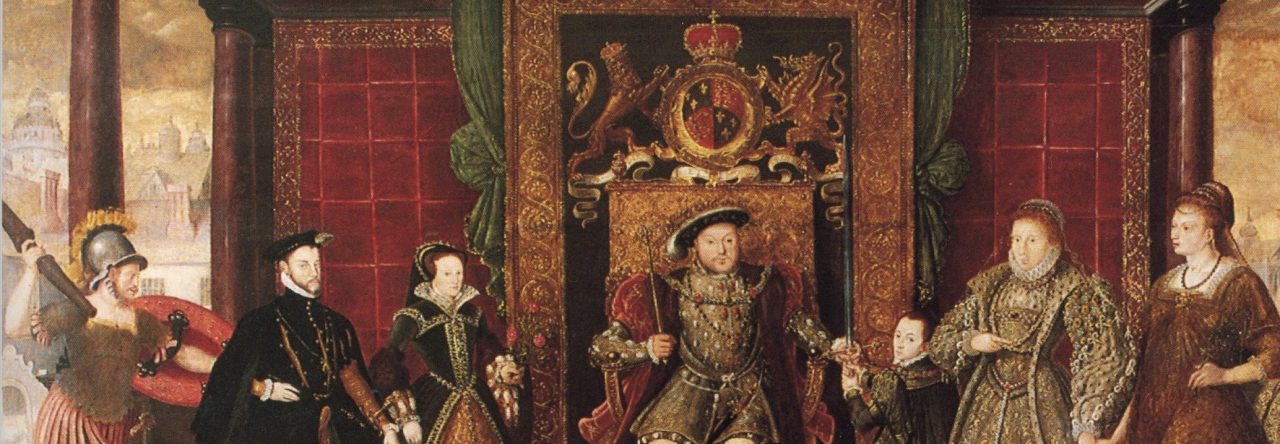
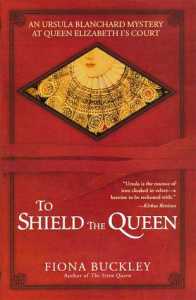 Queen Elizabeth I has a not-so-secret infatuation with her Master of the Horse, Robert Dudley. However, there is a problem. Dudley is married to Amy Robsart Dudley, a woman who is extremely ill. She suspects that her husband wants her dead, so Elizabeth sends one of her servants, Ursula Blanchard, to reassure Amy. However, disaster strikes, and it is up to Ursula to figure out what happened to Amy Dudley and foil a plot against the queen. Can Ursula solve the case, or will she be forced to lose those she holds dear for the sake of the queen? Fiona Buckley introduces Ursula Blanchard and her Tudor world to the modern audience in her first book in the Ursula Blanchard Mystery series, “To Shield the Queen.”
Queen Elizabeth I has a not-so-secret infatuation with her Master of the Horse, Robert Dudley. However, there is a problem. Dudley is married to Amy Robsart Dudley, a woman who is extremely ill. She suspects that her husband wants her dead, so Elizabeth sends one of her servants, Ursula Blanchard, to reassure Amy. However, disaster strikes, and it is up to Ursula to figure out what happened to Amy Dudley and foil a plot against the queen. Can Ursula solve the case, or will she be forced to lose those she holds dear for the sake of the queen? Fiona Buckley introduces Ursula Blanchard and her Tudor world to the modern audience in her first book in the Ursula Blanchard Mystery series, “To Shield the Queen.” The wives of Henry VIII have been an area of fascination for history nerds and novices alike for centuries. We all know the stories of Catherine of Aragon, Anne Boleyn, Jane Seymour, Anna of Cleves, Katherine Howard, and Kateryn Parr. However, these stories only offer a glimpse at the lives of these women. They follow the more traditional studies of the Tudor queens, but what happens if we take a more revisionist approach to their lives? What can we learn about these women besides their crowns and who they all married? There is more to their stories, like the minute details that Jessica Carey-Bunning explores in her book, “The Wives of Henry VIII: Rethinking the Stories Behind the Symbols.”
The wives of Henry VIII have been an area of fascination for history nerds and novices alike for centuries. We all know the stories of Catherine of Aragon, Anne Boleyn, Jane Seymour, Anna of Cleves, Katherine Howard, and Kateryn Parr. However, these stories only offer a glimpse at the lives of these women. They follow the more traditional studies of the Tudor queens, but what happens if we take a more revisionist approach to their lives? What can we learn about these women besides their crowns and who they all married? There is more to their stories, like the minute details that Jessica Carey-Bunning explores in her book, “The Wives of Henry VIII: Rethinking the Stories Behind the Symbols.”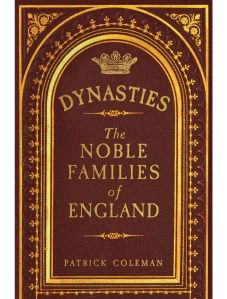 When we think about royal history, we often tend to think about the monarchs and their immediate families. However, the stories of the noble families that surround the crown can have some of the more interesting tales of how the families were created and how they survived. The stories of the English nobility are particularly fascinating, with some families and titles dating back centuries. How did these great families begin? How did they earn their titles? Who were the major figures in these noble houses, and how did they survive to the modern day? Patrick Coleman explores the tales of the nobility and how they shaped England’s history in his book, “Dynasties: The Noble Families of England.”
When we think about royal history, we often tend to think about the monarchs and their immediate families. However, the stories of the noble families that surround the crown can have some of the more interesting tales of how the families were created and how they survived. The stories of the English nobility are particularly fascinating, with some families and titles dating back centuries. How did these great families begin? How did they earn their titles? Who were the major figures in these noble houses, and how did they survive to the modern day? Patrick Coleman explores the tales of the nobility and how they shaped England’s history in his book, “Dynasties: The Noble Families of England.”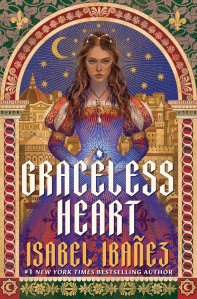 In the Italian states during the 15th century, a time of war coexisted with a period of art flourishing. But what if magic was thrown into the fray? Sculptress Ravenna Maffei desires nothing more than to create art and to protect her family while keeping her own magical powers a secret. To protect those she holds dear, Ravenna enters an art contest, hosted by the immortal family of Florence, the Luni. Ravenna is taken by the family to complete an important task, but if she fails, she will be killed by the heir of the family, Saturnino Luni. Unfortunately, the greatest danger lurks outside of Florence as the pope is waging war against magic itself. Can Ravenna uncover the secrets of the Luni family and finish their difficult task before war engulfs all of Florence? Ravenna’s story is told in Isabel Ibanez’s latest historical fantasy novel, “Graceless Heart.”
In the Italian states during the 15th century, a time of war coexisted with a period of art flourishing. But what if magic was thrown into the fray? Sculptress Ravenna Maffei desires nothing more than to create art and to protect her family while keeping her own magical powers a secret. To protect those she holds dear, Ravenna enters an art contest, hosted by the immortal family of Florence, the Luni. Ravenna is taken by the family to complete an important task, but if she fails, she will be killed by the heir of the family, Saturnino Luni. Unfortunately, the greatest danger lurks outside of Florence as the pope is waging war against magic itself. Can Ravenna uncover the secrets of the Luni family and finish their difficult task before war engulfs all of Florence? Ravenna’s story is told in Isabel Ibanez’s latest historical fantasy novel, “Graceless Heart.”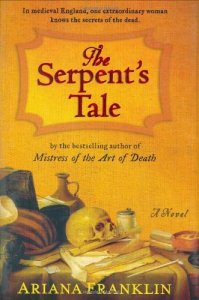 The story of Henry II and Eleanor of Aquitaine is legendary. The queen of France decided to divorce her first husband and marry the young upstart Henry Plantagenet. But things turned disastrous for the couple when Eleanor sided with their sons in a revolt against Henry later in life. At this time, Henry took a mistress named Rosamund Clifford, but when Rosamund was found dead in her tower, it is believed that Eleanor exacted her revenge on the poor woman. It is now up to Adelia Aguilar to solve the case before another civil war breaks out. This is the premise of book two in the Mistress of the Art of Death series by Ariana Franklin, which is entitled “The Serpent’s Tale.”
The story of Henry II and Eleanor of Aquitaine is legendary. The queen of France decided to divorce her first husband and marry the young upstart Henry Plantagenet. But things turned disastrous for the couple when Eleanor sided with their sons in a revolt against Henry later in life. At this time, Henry took a mistress named Rosamund Clifford, but when Rosamund was found dead in her tower, it is believed that Eleanor exacted her revenge on the poor woman. It is now up to Adelia Aguilar to solve the case before another civil war breaks out. This is the premise of book two in the Mistress of the Art of Death series by Ariana Franklin, which is entitled “The Serpent’s Tale.”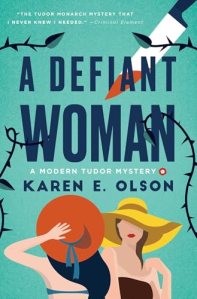 Have you ever wondered what the Tudors might be like in the modern day? What kind of life would they live, and would they all survive? What if King Henry VIII were a billionaire and most of his wives were still alive, including Anne Boleyn? Anne Boleyn is living but is in hiding from the rest of the Tudor clan and is separated from her daughter. When her daughter is kidnapped, Anne has to come back to her old life and team up with Henry’s latest wife to save her daughter. Can they save Anne’s daughter before it’s too late? Karen E. Olson brings the Tudors to the modern age in her latest novel, “A Defiant Woman.”
Have you ever wondered what the Tudors might be like in the modern day? What kind of life would they live, and would they all survive? What if King Henry VIII were a billionaire and most of his wives were still alive, including Anne Boleyn? Anne Boleyn is living but is in hiding from the rest of the Tudor clan and is separated from her daughter. When her daughter is kidnapped, Anne has to come back to her old life and team up with Henry’s latest wife to save her daughter. Can they save Anne’s daughter before it’s too late? Karen E. Olson brings the Tudors to the modern age in her latest novel, “A Defiant Woman.” I am pleased to welcome Lady Harriet and Dr. Peter Stephenson to my blog to share an excerpt from their novel, The Witch of Godstow Abbey. I would like to thank Lady Harriet, Dr. Peter Stephenson, and The Coffee Pot Book Club for allowing me participate in this blog tour.
I am pleased to welcome Lady Harriet and Dr. Peter Stephenson to my blog to share an excerpt from their novel, The Witch of Godstow Abbey. I would like to thank Lady Harriet, Dr. Peter Stephenson, and The Coffee Pot Book Club for allowing me participate in this blog tour. Blurb:
Blurb: Lady Harriet holds the legal title “Lady of the Manor,” as defined under English law, and traces her ancestry to Charlemagne’s royal line.
Lady Harriet holds the legal title “Lady of the Manor,” as defined under English law, and traces her ancestry to Charlemagne’s royal line. Dr. Peter Stephenson has written or contributed to over twenty books, all but one of which are non-fiction technical books. He has published over 1,000 papers in technical journals, technical trade journals, and peer-reviewed legal journals. One of his peer-reviewed papers has over 15,400 downloads.
Dr. Peter Stephenson has written or contributed to over twenty books, all but one of which are non-fiction technical books. He has published over 1,000 papers in technical journals, technical trade journals, and peer-reviewed legal journals. One of his peer-reviewed papers has over 15,400 downloads.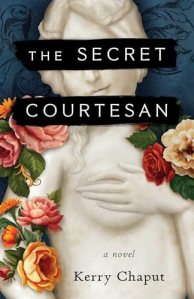 A statue several centuries old has been discovered in Italy. The leading male art expert believes that it was created by a sculptor named Lucca Armani. He has asked Dr. Mia Harding to support his research, but Dr. Mia feels that something is amiss. Sofia Rossi is a courtesan living in Renaissance Venice who aspires to a life devoted to creating art. Sofia and Mia may be separated by centuries, but their lives and reputations are tied to this mysterious statue. Can Dr. Mia figure out the truth of the statue before her time runs out? Kerry Chaput tells the tale of these two remarkable women in her novel, “The Secret Courtesan.”
A statue several centuries old has been discovered in Italy. The leading male art expert believes that it was created by a sculptor named Lucca Armani. He has asked Dr. Mia Harding to support his research, but Dr. Mia feels that something is amiss. Sofia Rossi is a courtesan living in Renaissance Venice who aspires to a life devoted to creating art. Sofia and Mia may be separated by centuries, but their lives and reputations are tied to this mysterious statue. Can Dr. Mia figure out the truth of the statue before her time runs out? Kerry Chaput tells the tale of these two remarkable women in her novel, “The Secret Courtesan.”